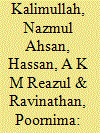| Srl | Item |
| 1 |
ID:
103266


|
|
|
|
|
| Publication |
2011.
|
| Summary/Abstract |
The demand for energy in Bangladesh and India have been increasing due to rapid urbanization, industrialization, rising incomes, and growing use of energy-intensive products. Bangladesh faces extraordinary challenges in the energy sector. It has substantial economically recoverable natural gas reserves. But its energy mix is highly dependent on gas. The government of Bangladesh has prepared a proposal to set up a nuclear power plant and has decided to install wind-based independent power plants in offshore areas. On the other hand, India also faces a formidable challenge in meeting its energy needs and providing adequate and affordable energy to all sections of society in a sustainable manner. India's energy concerns established a new dynamism when the Indian government decided to explore and execute transportation of natural gas through proposed pipelines such as Iran-Pakistan-India pipeline project, Turkmenistan-Afghanistan-Pakistan-India pipeline project and Myanmar-Bangladesh-India pipeline project. But the proposed Myanmar-Bangladesh-India pipeline project was withheld during the period of 2001-2006 due to political mismatch between Bangladesh and India. However, there are several other scopes which can be explored in terms of energy security cooperation on bilateral and multilateral basis. The Prime Minister of Bangladesh, Sheikh Hasina and the Prime Minister of India, Dr. Manmohan Singh agreed in a joint communiqué in New Delhi on 13 January 2010 to put in place a comprehensive framework of cooperation for development between the two countries, encapsulating their mutually shared vision for the future, which includes cooperation in energy, among others.
|
|
|
|
|
|
|
|
|
|
|
|
|
|
|
|
| 2 |
ID:
103265


|
|
|
| 3 |
ID:
103268


|
|
|
|
|
| Publication |
2011.
|
| Summary/Abstract |
The year 2008 brought unprecedented change for Nepal when almost 250-year old monarchy was replaced with a democratically elected government. With that, the world's only Hindu Kingdom came to an end. The country endured years of political crisis that had not only bred economic instability but also social turmoil. The 10-year long struggle against monarchy that started in 1996 in the name of 'Maoist insurgency' did succeed in dethroning the King. However, the country is still in the grip of political differences and yet to adapt to the democratic trends. Nepal's experience from monarchy to democracy has been a history of enduring contradictions. Making process of democratization a reality in Nepal seems to be a formidable task for there still is a power struggle going on among political parties. For a developing country like Nepal, abolition of monarchy and formation of a democratically elected government is not the beginning of a new era but a crucial phase in battered politics where the future of democracy is yet to be decided.
|
|
|
|
|
|
|
|
|
|
|
|
|
|
|
|
| 4 |
ID:
103267


|
|
|
| 5 |
ID:
103270


|
|
|
|
|
| Publication |
2011.
|
| Summary/Abstract |
One of the recent foreign policy priorities of the Government of Bangladesh is to consider Africa as a major region of huge economic potential. This paper examines the potential of Bangladesh's exports to African countries by adopting an augmented stochastic frontier gravity model. It reveals significant export potential in some selected African countries, which can be utilized by removing 'behind the border' constraints. The paper also explores the investment potential in the African countries to benefit backward linkage industries of Bangladesh as well as to create employment in agriculture, food processing and pharmaceutical industries. It reveals that Bangladesh can export considerable number of skilled professionals and semi-skilled workers in the mineral and service sectors in African countries by strengthening mutual cooperation.
|
|
|
|
|
|
|
|
|
|
|
|
|
|
|
|
| 6 |
ID:
103269


|
|
|
|
|
| Publication |
2011.
|
| Summary/Abstract |
Literature on civil war, insurgency and terrorism has highlighted the role of other causal factors such as the scarcity of valuable natural resources, the degree of ethnic fractionalization, societal segmentation and the type of political regime while showing short shrift to the importance of population age structure. Saying this does not in any way denude these factors of their significant role in the onset of civil war but the importance of youthful age structure in insurgency based civil wars and terrorism should not be undermined. Numerous studies explicated how female deficits in Asia could drive the youths into the vortex of violence and terrorist activities. Taking India and China as case studies, this paper argues that a significant number of young adult males will not be able to tie the nuptial bond due to deficit of women in the society. These left out unmarried adult males would be the stirring causes of conflicts, insurgency, civil war and acts of terrorism intensely affecting the perspectives of democracy in these countries.
|
|
|
|
|
|
|
|
|
|
|
|
|
|
|
|